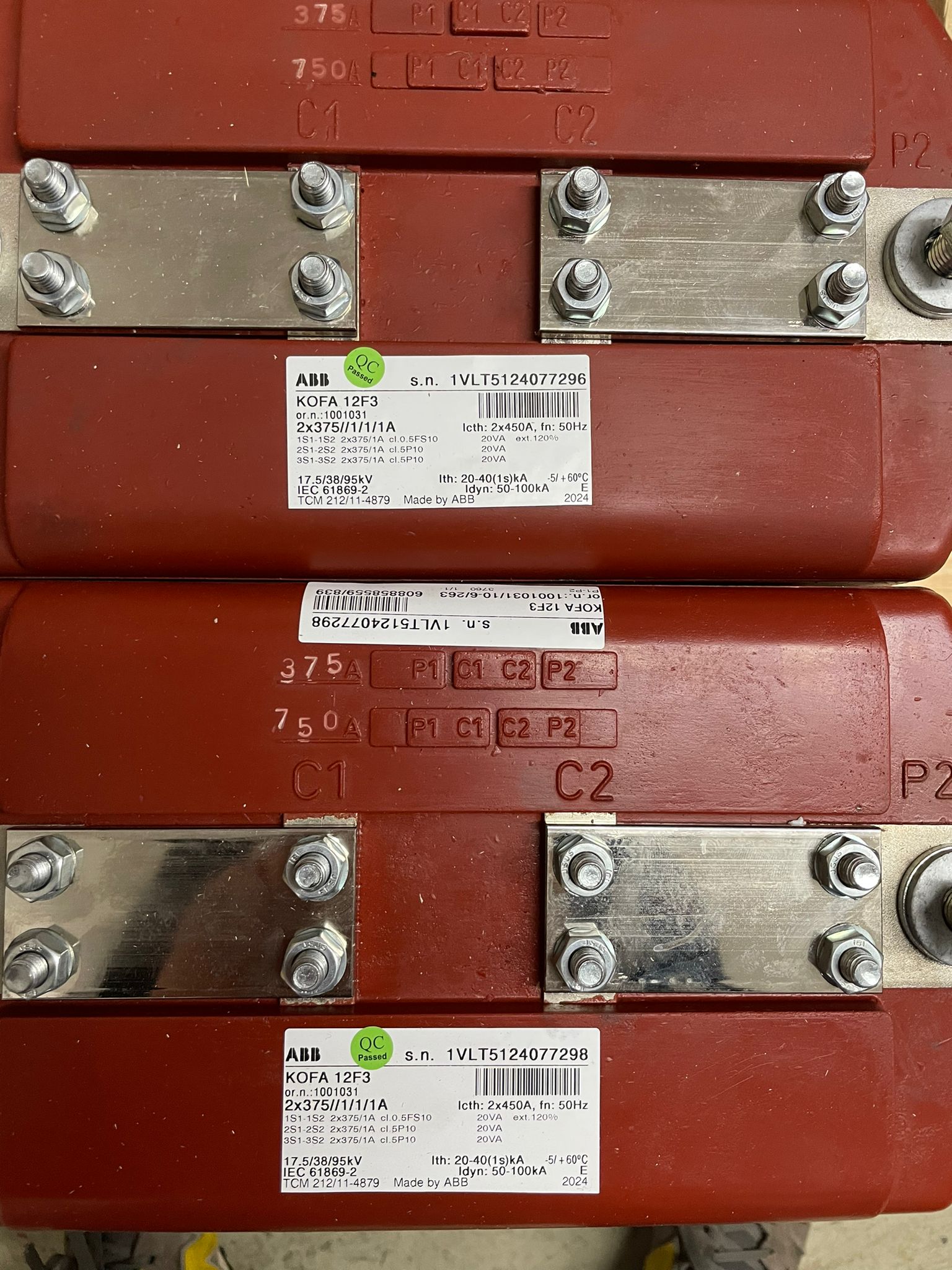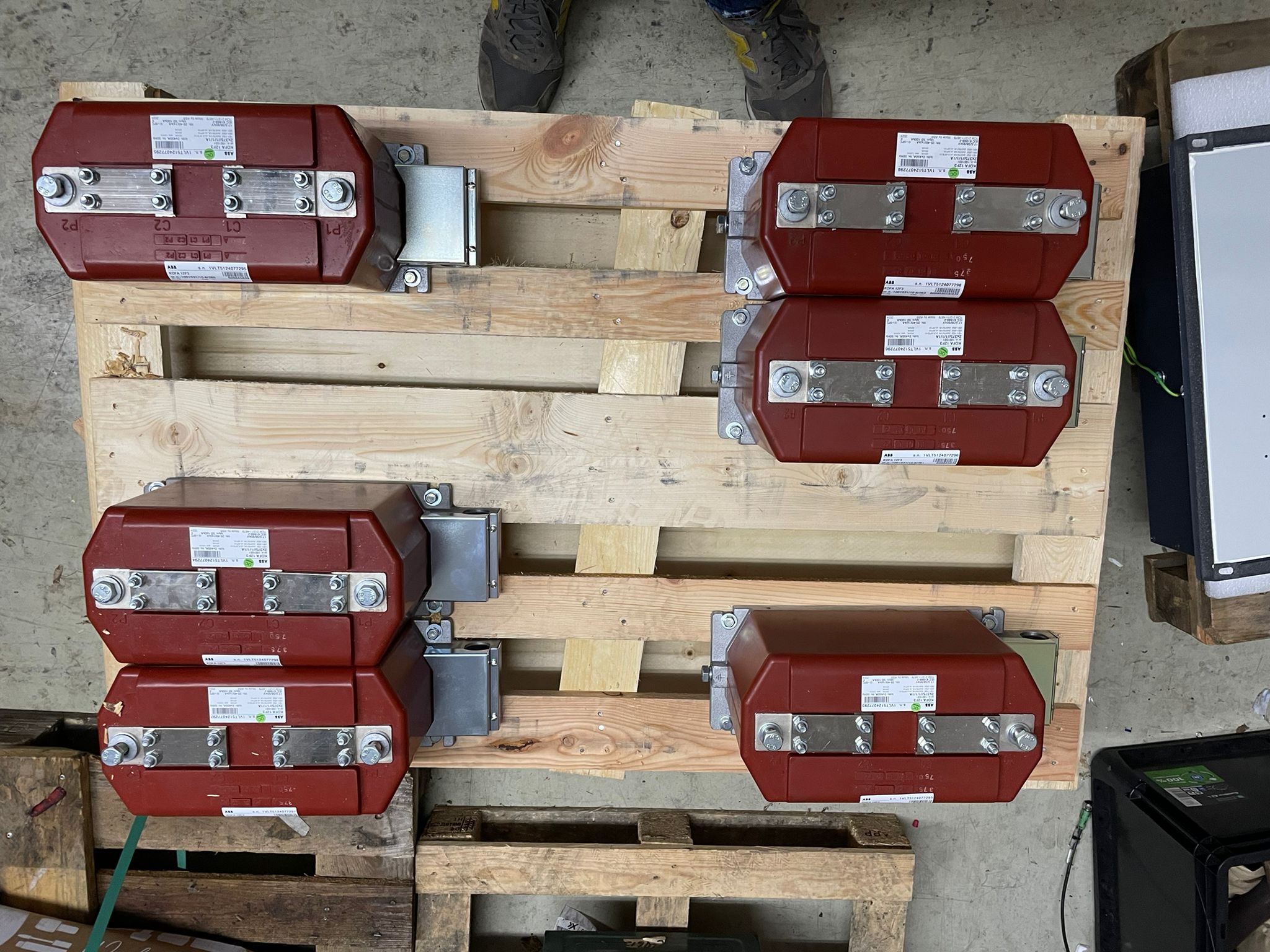Home › Gallery › ABB KOFA 12F3
ProcureEaze USA Inc does not sell, stock, or export equipment — we are a procurement service provider.
This page is a case note, not a sales listing. It documents the sourcing and delivery of ABB KOFA 12F3 busbar current transformers under IEC 61869, coordinated by Impro Solutions UK Ltd (parent to ProcureEaze USA Inc). We handle verification, compliance, and logistics.
ABB KOFA 12F3 Busbar Current Transformer (IEC 61869) — overview

On this page
Project context & why it mattered
In a combined‑cycle plant, the electrical completion path is only as strong as a handful of small, “boring” parts. Current transformers are one of them. Without the correct CTs on a busbar, you can’t close protection loops, can’t run secondary injection tests, and can’t hand over cleanly to commissioning. The ABB KOFA 12F3 units documented here unblocked that exact bottleneck.
Our client needed a verifiable route to the right KOFA build. The risks were simple: a ratio/class mismatch or an unverified channel would delay protection testing or create avoidable audit drama later. A mispicked CT isn’t just expensive — it wastes commissioning windows and forces rework.
KOFA 12F3 in plain terms
The KOFA family from ABB are cast‑resin current transformers designed for busbar installation. They reduce primary current to a safe, measurable level for relays and meters. The IEC 61869 series defines performance requirements — accuracy classes, thermal and dynamic withstands, insulation coordination, and more.
From the nameplate visible in our photographs, these delivered units were configured for heavy short‑time withstand typical of medium‑voltage distribution. Exact electrical numbers vary with the order code and must be confirmed against ABB’s datasheet for your scheme.
- Installation: clamp to busbar with steel brackets and spacers; maintain dielectric clearances.
- Terminals: secondary studs are grouped and labelled for polarity; shorting links required during maintenance.
- Use cases: feeder protection, transformer differential schemes, and metering.
How we sourced, verified & documented
Verification steps
- Matched KOFA 12F3 ordering code to the project SLD and relay settings sheets.
- Checked IEC 61869 accuracy and burden requirements against protection design.
- Captured serial numbers from every unit and linked them to packing documents.
- Kept supplier vetting + traceability logs for audit readiness.
Compliance posture
- Trade compliance screening for parties and destinations on the route.
- Paperwork set: commercial invoice, packing list, and origin statements as applicable.
- Photographic record at pack‑out and at receipt to prove condition.

Quality, packaging & logistics
Reliability here is mostly about how the equipment travels. The plan used internal spacing and strapping so that the moulded bodies could not rub and the terminal studs could not take a side hit. Shock indicators were applied and a moisture barrier was used where humidity was a risk on route. On arrival, the receiving team executed a quick POD sequence — external photo, crate open, pallet view, nameplate close‑ups, and serial capture.
Those steps make warranty conversations short if anything ever does go wrong, and they feed a QA trail that owner’s engineers tend to appreciate at handover.
Engineering observations from the photos
- Polarity marks: the secondary terminals are clearly labelled. Keep your test sheet polarity consistent to avoid nuisance differential alarms later.
- Mechanical footprint: the bracket and spacer geometry visible in the photos is a good reminder to leave room in bus duct drawings.
- Nameplate capture: copy the insulation and short‑time current values into the commissioning dossier; it speeds future audits.
- Handling: avoid solvents on the printed nameplate and protect terminal threads during installation.
Lessons learned you can reuse
- Freeze the order code early. Most delays on CTs are simple catalogue mismatches. Lock the code with the protection engineer before you request quotes.
- Serials are gold. Capture every serial, map it to packing and test sheets, and you’ll never argue provenance later.
- Photograph everything. Pallet view + nameplates = five minutes now, hours saved later.
- Coordinate delivery with pre‑commissioning. Getting CTs in ahead of relay works keeps the schedule honest.
Buyer checklist (copy/paste)
- Confirm KOFA 12F3 and required ratio/class to match relay settings.
- Validate IEC 61869 class and burden against your protection scheme.
- Document serial numbers per unit in the receiving log.
- Ask for packaging photos prior to dispatch; protect terminals.
- Schedule delivery to align with pre‑commissioning test windows.
FAQ: our service‑only model
Do you sell ABB KOFA CTs?
No. ProcureEaze USA Inc is a procurement service provider. We locate, verify, and coordinate delivery from approved channels for our clients. We do not maintain stock and do not act as a reseller or exporter.
Can you support different ratios or accuracy classes?
Yes. We validate ordering codes against your drawings and relay settings, then identify the compliant supply route.
What kind of documentation do you keep?
We keep a record pack for each transaction: photos, serial logs, supplier documents, and logistics papers — so your QA and owner’s engineer have a clean trail.
Attribution: Photographs originate from project handling records by Impro Solutions UK Ltd. Any specification values mentioned are narrative only; confirm against ABB documentation before design or commissioning decisions.